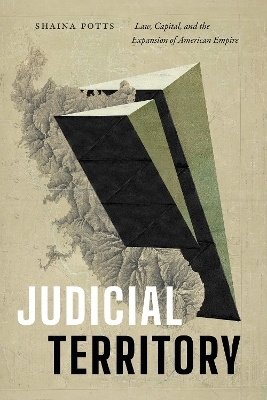
Judicial Territory
Law, Capital, and the Expansion of American Empire
Seiten
2024
Duke University Press (Verlag)
978-1-4780-2648-8 (ISBN)
Duke University Press (Verlag)
978-1-4780-2648-8 (ISBN)
Shaina Potts traces how the post-World War II expansion of United States judicial authority in the economies of foreign governments promotes the interests of the American empire abroad.
In Judicial Territory, Shaina Potts reveals how the American empire has benefited from the post-World War II expansion of United States judicial authority over the economic decisions of postcolonial governments. Introducing the term “judicial territory” to refer to the increasingly transnational space over which US courts wield authority, Potts argues that law is an essential tool for US geopolitical and economic interests. Through close examination of cases involving private US companies, on the one hand, and foreign state-owned enterprises, nationalizations, and sovereign debt, on the other, she shows that technical changes relating to the treatment of foreign sovereigns in domestic US law allowed the United States to extend its purview over global financial and economic relations, including many economic decisions of foreign governments. Throughout, Potts argues, US law has not become divorced from territoriality but instead actively remapped it; it has not merely responded to globalization, but actively produced it—making the whole world part of US economic space in the process.
In Judicial Territory, Shaina Potts reveals how the American empire has benefited from the post-World War II expansion of United States judicial authority over the economic decisions of postcolonial governments. Introducing the term “judicial territory” to refer to the increasingly transnational space over which US courts wield authority, Potts argues that law is an essential tool for US geopolitical and economic interests. Through close examination of cases involving private US companies, on the one hand, and foreign state-owned enterprises, nationalizations, and sovereign debt, on the other, she shows that technical changes relating to the treatment of foreign sovereigns in domestic US law allowed the United States to extend its purview over global financial and economic relations, including many economic decisions of foreign governments. Throughout, Potts argues, US law has not become divorced from territoriality but instead actively remapped it; it has not merely responded to globalization, but actively produced it—making the whole world part of US economic space in the process.
Shaina Potts is Associate Professor of Geography at the University of California, Los Angeles.
Acknowledgements ix
Introduction 1
1. Law, Capital, and the Geographies of Empire 29
2. The Politics of the Private 55
3. Revolution and Counterrevolution 87
4. Debt, Default, and Judicial Discipline 117
5. Sovereign Disobedience 145
Conclusion 171
Appendix 1: Selected Timeline of the Expansion of US Judicial Territory 185
Appendix 2: List of Cases and Auxiliary Case Documents 191
Notes 199
Bibliography 249
Index 275
| Erscheinungsdatum | 24.07.2024 |
|---|---|
| Verlagsort | North Carolina |
| Sprache | englisch |
| Maße | 152 x 229 mm |
| Gewicht | 590 g |
| Themenwelt | Geschichte ► Teilgebiete der Geschichte ► Militärgeschichte |
| Naturwissenschaften ► Geowissenschaften ► Geografie / Kartografie | |
| Recht / Steuern ► Rechtsgeschichte | |
| Sozialwissenschaften ► Soziologie | |
| ISBN-10 | 1-4780-2648-0 / 1478026480 |
| ISBN-13 | 978-1-4780-2648-8 / 9781478026488 |
| Zustand | Neuware |
| Haben Sie eine Frage zum Produkt? |
Mehr entdecken
aus dem Bereich
aus dem Bereich
neueste Manipulationstechniken als Waffengattung der NATO
Buch | Softcover (2023)
Westend (Verlag)
CHF 33,55
Deutschlands Schwäche in der Zeitenwende
Buch | Softcover (2023)
C.H.Beck (Verlag)
CHF 25,20


